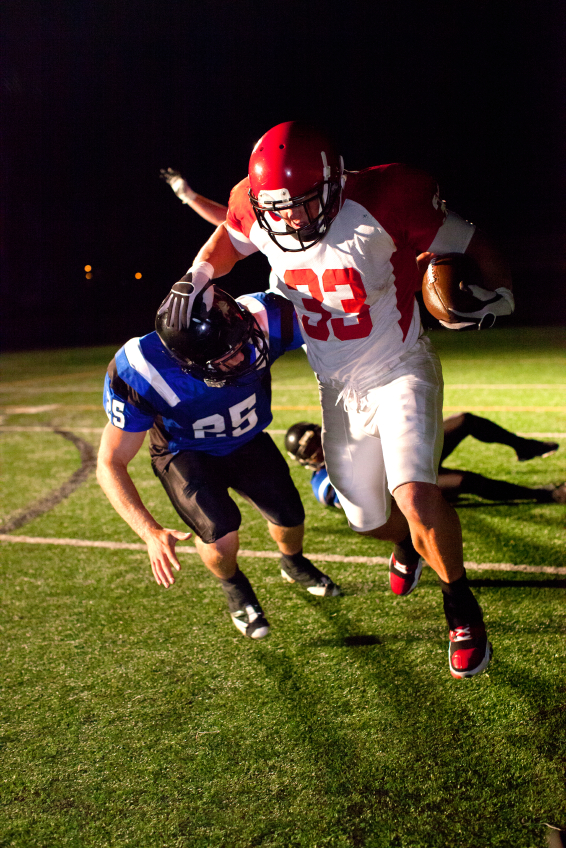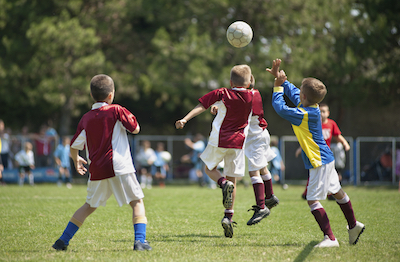The ACL Epidemic in Sports, Part 1: Failure
“It was nine seconds into the game that I got to carry the ball for the first time.”
And as he had done so many times that season, TJ, the Spartan’s standout sophomore running back, fought his way through a crowd of blockers before breaking into open space behind the defense. On a chilly night in rural Pennsylvania, TJ took the ball on the first play of the game and bolted nearly 60 yards down the right sideline.
 You can hear the excitement in his voice as he talks about the run. “I had only one guy left in front of me. I wanted that first touchdown. We were big underdogs and this score would have been huge for us.” He remembers hearing the crowd’s cheers grow louder the further he ran. He thinks he heard his dad whistling as he rushed past the 20-yard line. Everyone was watching the undersized running back as he raced to give his team the lead against the defending state champions. And then he did something that brought nearly every one of the 12,000 people in the stadium to their feet.
You can hear the excitement in his voice as he talks about the run. “I had only one guy left in front of me. I wanted that first touchdown. We were big underdogs and this score would have been huge for us.” He remembers hearing the crowd’s cheers grow louder the further he ran. He thinks he heard his dad whistling as he rushed past the 20-yard line. Everyone was watching the undersized running back as he raced to give his team the lead against the defending state champions. And then he did something that brought nearly every one of the 12,000 people in the stadium to their feet.
“I knew that I had to cut back toward the middle of the field to have any chance of reaching the end zone.” His excitement fades a bit as he continues. “I tried to make a quick cut to the left. But when I did, I felt my knee give out. I knew right away that something was wrong. I heard this loud popping sound and then I fell. I wanted to get up and keep running, but the pain in my knee was worse than anything that I had ever felt before.”
Moments after recording his longest run of the season, TJ laid on the field a few yards from the end zone clutching his right knee.
“I tore my ACL on that play. I went from thinking I was scoring a touchdown to thinking that my season had just ended in a matter of seconds.”
Scenes like this play out more than 250,000 times each year in the United States, according to the Center for Disease Control and Prevention (CDC). Young athletes like TJ have seen a 200% increase in ACL injuries over the past decade and nothing indicates that this is changing anytime soon.
Sports medicine researchers have studied ACL injuries extensively for more than 20 years and many significant advances in surgery and rehabilitation have come from these investigations. But despite this massive body of knowledge, young athletes continue to suffer ACL injuries at an alarming rate. The approach of the sports medicine industry has been highly reactive and the numbers indicate that our best efforts to prevent ACL injuries have failed. Each year, a quarter of a million athletes are the victims of this failure.
With the help of his physician and high school athletic trainer, TJ returned to play part way through his junior season. He describes a grueling 10 month rehabilitation process that consisted of three sessions each week with a physical therapist and at least three other sessions with his athletic trainer at school.
“I worked really hard to get comfortable with running again. It took almost nine months before I was back to running full speed, but I was always worried that my knee would give out if I tried to cut too quickly.”
Many years have passed since TJ first tore his ACL–more than enough time to fully realize just how troublesome and taxing this injury can be. The changes in TJ’s life would prove to be as dramatic as the fateful move that led to his injury in the first place. “I had no idea that my ACL injury would have led to so many other issues. I don’t think many people understand that the effects of this injury can last a really long time.”
The Sports Injury Prevention Program at Hospital for Special Surgery presents this blog series to explore the staggering rise in ACL tears–one of sport’s most devastating and costly injuries. The series will highlight the urgent need for effective ACL injury prevention programming by featuring a high school football athlete, TJ, whose own ACL injury experience and long term difficulties will be chronicled. Parents, coaches, athletes, sports administrators, teachers, and others that are involved in the development or training of young athletes are invited to follow this series to learn how the Sports Injury Prevention Program at HSS plans to make an impact on ACL injury prevention for young athletes.
Look for Part Two of this series next week, in which we take a closer look at the risk factors of ACL injury and explore why more than a quarter of a million athletes have their seasons ended by ACL tears each year. In the meantime, please share your stories of young athletes like TJ that have suffered an ACL injury and the challenges they have faced as a result.
Joseph Janosky is a Physical Therapist and Athletic Trainer and the Manager of the Sports Injury Prevention Program at Hospital for Special Surgery in New York. He brings more than 20 years of experience to the development of sports injury prevention systems. He has had considerable clinical involvement with youth, high school, collegiate, and professional athletes and among his many professional interests are ACL rehabilitation, care for the overhead athlete, motor learning strategies for sport skill acquisition, and preparing athletes for return to play after an injury. He has taught at both the University of Scranton and Marywood University and is currently pursing doctorate degrees in both physical therapy and human and sport performance.
